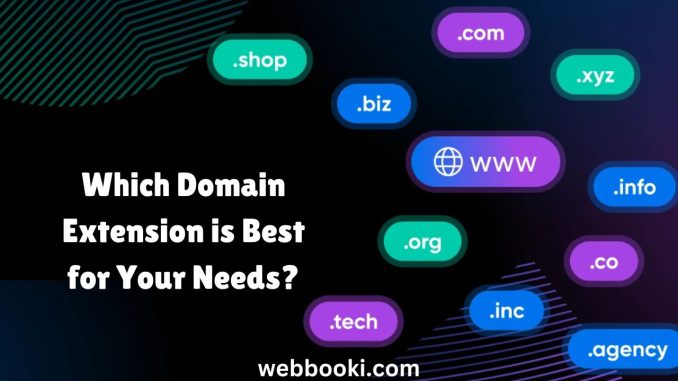
Picking up the right domain extension is considered a crucial step in building an online presence. The domain extension, or top-level domain (TLD), affects the perceived credibility of your site, search engine optimization, and user perception. Here’s a rundown of the most common domain extensions and some helpful tips to help you decide upon the best one for your needs.
Which Domain Extension is Best for Your Needs?
1. .com
The .com extension is not only the most popular but also the most recognized domain extension. Although .com initially meant for commercial businesses, it has now become the default choice for several other types of websites that include blogs, portfolio sites, and e-commerce sites. Familiarity lends credibility and trust to your site, which is one reason why .com is often the best option for most businesses. It’s usually worth selecting if a relevant .com domain is available.
2. .org
The .org extension is mainly used by non-profit organizations, educational institutions, and community groups. Anyone can have a .org domain, but a .org ending basically gives an impression of social trust and responsibility. If you run a non-profit or community-focused initiative, this is the excellent choice to convey your mission and values through a .org domain.
3. .net
The .net extension was originally used specifically for network-related businesses, but it has become a popular alternative to .com. If your first choice .com domain name isn’t available, a good fallback might be a .net. However, it’s less commonly used than .com, so consider how that matches up with your brand’s image.
4. Country Code TLDs (.in, .uk, .ca)
ccTLDs are country-specific extensions, examples of which include countries like India (.in), United Kingdom (.uk), or Canada (.ca). In such a situation, if your business targets a local audience, then having a ccTLD can enhance the organic visibility in local search listings and resonate with regionally-based customers. This tells other users that, in fact, the business is from a location, forming the foundation for developing a sense of trust among the local users.
5. New gTLDs (.tech, .shop, .blog)
All this changed with the arrival of new generic top-level domains. Extensions like .tech, .shop, or .blog give you a more targeted approach that may be applied to better describing what your website will be about. If your brand can creatively make use of one of these new gTLDs, then it could very well help set you apart from the competition. But tread with caution: while these can add to branding, they perhaps don’t carry as much in weight compared to their traditional counterparts.
6. .edu and .gov
The .edu extension is reserved for United States-accredited educational institutions, and .gov websites can only be registered to governmental entities. If you happen to fall into one of those categories, these extensions automatically bring a great deal of authority and trust with your website. Of course, neither is available to the general public.
Choosing the Extension that is Best
Now consider the following factors when deciding which domain extension to use:
- Purpose of Your Website: Decide what type of website it is that you will build. The rule of thumb is that .com suits best for commercial websites, while non-profits should opt primarily for the .org domain extension.
- Target Market: If your target market is location-based, a ccTLD can help you appear more local. Branding: Reflect on how this extension fits within your brand. A unique gTLD will help differentiate you, provided that said gTLD actually aligns with a mission that helps define you.
- Availability: Sometimes, your desired name is not available with your desired extension. In such cases, use more flexibility and find alternatives.
Conclusion
Ultimately, it all depends on what you’re trying to do and whom you are trying to reach. Yes, .com remains the gold standard for most websites, but you may be fine with .org and .net-not to mention a whole host of gTLDs. Take the time to think about your options, then you shall choose a good extension which will reflect your brand identity and operations. Thoughtfulness in consideration will make all the difference in your online presence and success.
Leave a Reply